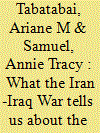| Srl | Item |
| 1 |
ID:
134903


|
|
|
|
|
| Summary/Abstract |
This article challenges the standard narrative of interwar U.S. involvement in the Middle East by arguing that the United States did have both interests in and a policy concerning Iraq during that time. Despite being non-belligerents with the Ottoman Empire during the First World War and non-members of the League of Nations thereafter, the U.S. government consistently advanced the claim that the American contribution to the Allied victory entitled it to equal political and economic opportunities in the Middle East and to a voice in postwar Middle Eastern affairs. U.S. officials vigilantly intervened in the region throughout the period to ensure not only American access to petroleum resources, but also, as is shown in Iraq, to insist on political relations unmediated by Great Britain. British acceptance of this implies that the foundations had thereby been laid for an independent American role in the Middle East, preceding the later thresholds usually cited by historians. The open door policy the U.S. government set out in the correspondence with Britain in 1920–21 represents a full and cogent policy on Iraq that was advanced throughout the interwar period to protect American interests and standing in that country.
|
|
|
|
|
|
|
|
|
|
|
|
|
|
|
|
| 2 |
ID:
153633


|
|
|
|
|
| Summary/Abstract |
The 1980–88 Iran-Iraq War stands as the pivotal event for Iran's national security strategy, especially as it pertains to the country's controversial nuclear program. The “imposed war,” as it is known to Iranians, caused Iran to view itself as isolated and on the defensive, striving for self-reliance and survival in what it continues to perceive as an unjust international order. The war has shaped both Iran's strategic outlook generally and its nuclear policies specifically. It was a decisive factor in determining the nature and scope of Iran's nuclear activities, as well as in Iran's approach to the international negotiations surrounding those activities, which in 2015 produced the Joint Comprehensive Plan of Action. Both during those talks and after the implementation of the deal began, Iranian decisionmakers regularly invoked the history and lessons of the war to construe their decisionmaking process and define their bottom lines. Yet the war and its implications for Iran's strategic culture and nuclear thinking remain understudied and misunderstood. If the implementation of the deal and a longer-term resolution of the conflict over Iran's nuclear program are to succeed, the history of the Iran-Iraq War and the vital lessons that Iran has drawn from it must be appreciated.
|
|
|
|
|
|
|
|
|
|
|
|
|
|
|
|